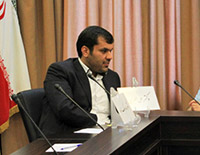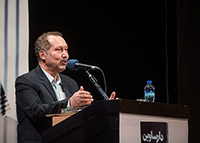Difference between written memories and oral history (part I)
Similar in appearance, but different
Akram Dashtban
Translated by: Fazel Shirzad
2018-5-9
The following report is based on an invitation in which history experts are asked questions about oral history. In this regard, two experts, Saeid Alamian and Ali Tatari have been answered, as their perspective, to the one of the questions titled "Difference between written memories and oral history". We'll read these comments as follows.
Same procedures and different instructions
Memories and oral history are similar in appearance, but different, and include issues that, according to the experts of these fields, suffer from the poverty of the theoretical and scientific contents and do not have adequate and scientific criteria for defining and differentiating each other. Ali Tatari, the manager of library of Islamic Consultative Assembly's Document Center says that closeness of the method of oral memories and oral history is the reason of similarity of them. And he says about the definition of written memory: "written memory, as it comes from its name, in this field, a person write his/her historical experiences or events of life. Here, merely a person state personal events, but in oral history, a particular process should be taken to write an event that research is one part of this process. Research can be also done in the recording of memories, but making oral history of an event is conducted on the basis of an interview with a group of witnesses to that event or story.

He added: In oral history, before conducting an interview, research is conducted so that the author understand the story and adapt it to other documents and resources. Despite these differences, we still see that because of similarity between memory and oral history, the researcher does not distinguish between them, although their principles and methods are different. Memory is story of a person about society and oral history is a collective memory. Both of these are conducted by interview, but written memories are person-centered and, in oral history, events, stories, geographic environment, and etc. studied and recorded under researcher's supervision. In fact, oral history and written memory are same in methods, but are different in instructions.
The lack of precise definitions and the lack of differences between oral history and written memory are concern with the issue of the lack of theory; Taṭari explained:" Unfortunately, we have serious challenges in oral history's theoretical debates. So far, 12 conferences have been held by the Iranian Historical Society in various fields such as compilation, research, training and interviewing methods, but we have neglected the field of theorizing. Of course, the weakness of theory in theory does not only depend on oral history as a novel science. We have the same problem in the political sciences, and we have not yet succeeded in reaching the theory of political science since the establishment of political science in Iran in 1311, and what we read are mainly translated articles from Westerns that are not matched by Iran's situation.
To solve this problem in the field of oral history, Tatari added: we cannot go ahead in this way with a linear task, but we need planning and presenting the tasks in academic societies to use them, because Iran's universities still do not accept oral history as a scientific method.
He went on speaking about conferences in the field of oral history: Many conferences are held annually, but the important thing is how much these conferences are shared and injected into the community. Conferences are being held unorderly. Indeed, being governed of many scientific issues, such as oral history, caused the tasks, generally, to be damaged. When government has budget, researchers can be funded adequately and start working. When the budget goes down, the work will stays half-finished; the researcher will leaves the job and goes to another job. The theorizing is the result of a process to achieve science. When there is no protector to pay attention it in the country, theory won't be emerged.
Oral history is seeking revelation
Expressions of differences between written memories and oral histories represent the experience of people in the field that they have been exploring for years and certainly reached to similar or different views. Saeid Alamian, the author of revolutionary and Sacred Defense fields, is one of those people who believe that memory has a framework, and said:" Oral history has not yet reached a consensus on the theoretical debate, and it is not possible to define a genre for it. In fact, the scholars of this field did not provide digestible theories. In oral history, historian or interviewer discusses, into question and answer. About historical phenomenon with a group of informants. Oral history carries out recording and historiography, but historians do not know it as a historiography, and believe that literary aspect of work in oral history overcomes historical aspect.

Referring to the fact that written memories are seeking for single-case and follow subject in a linear way as much as necessary, he explained: In oral history, oral historian follows a historical phenomenon through the narrative of numerous narrators; these series of narrations called "oral history". Oral memory is an introduction for oral history. Oral history claims that it is not a discipline inherently (spontaneity), and whilst it has indices of literature, it considers itself as a historical discipline and a family of history. This claim is not widely accepted, because oral history has not come to a constant and full-fledged meaning in literature. Life story, memoirs, for example, and even a narrative document are part of the literature. In fact, it can be said that oral history is a family of literature and a product of oral memoirs’ findings. But again it is closer, in many cases, to history than literature. If we follow the meaning of oral history in literature, oral memories fit into the branches of literature, because authenticity, in the field of memory, is on narrator not an issue, but in oral history, authenticity is on the subject not a narrator."
He went on to explain the differences between oral history and memory and added: "In oral history, authenticity (root) of historical phenomenon is valid, but interviewer, in memoirs and writing memories, concords and helps narrator to narrate stories correctly. Those who write memory does not seek to discover historical mistakes, but historian is as a critic in oral history and research in the subject and may be in conflict with the interviewee and mention it in footnote.
Alamian explained writing method of oral history and memory: "In oral history, question will be deleted from the text. In oral memory, there is also a style of eliminating the question, but it can be added to the text, Such as recording of the memoirs of Mr. Rafiqdoost or Mr. Fethullah Jafari[1], whose writing style is similar to oral history, but the style of writing is not to delete question and should be included in the text.
He considered the output of oral memoirs more attractive than oral history, and said: "I find the process of diary books more attractive for readers, because those who write memory traces the story through time sequence, but they are looking for truths in oral history and want to discover the dark side of the story, which is more attractive to researchers of the field of history."
Alamian explained the criteria and question and answer in these two framate:" attractive and good questions are one of important criteria in recording memories and oral history and another important point is the subject's components, it means how the story of narrator is attractive for those who write memories. If journalist is looking for a subject, what several books has already been published about, readers could not be attracted it. Another point is about the type of interview; it is important who carries out an interview or quotes memories. In the past, autobiography had more advantage to the memoirs, because they had more credibility than oral memories. But I believe that the writer of memory, with a person's past study, can do a better dialogue and reach answers and points that narrator did not consider them important and did not mention them in his autobiography. He added: In oral history, memory are conversational one; narrator's memory can be transcribed in the form of writing and according grammatical rules to be readability. Writing memory does not deny the documents, but it is honest to the tune of narrator, and does not increase or decrease the narrator's words, and follows a storyline.
Iranian oral history website questions experts about oral history, and publish responses to readers. Total responses will have significant results. If you have any questions, please feel free to submit it via this page to read comments from experts of oral history!
[1] Both of them are books written and edited by Saeid Alamian; the first and second volumes "We Tell for History: the memoirs f Mohsen Rafigh Doost" published by the Office of Islamic Revolution Literature and the Sura Mehr Publications, and "Darsavin: Fethullah Jafri's Daily Notes", published by the Office of Literature and Art of Resistance's Sura Mehr Publications.
Number of Visits: 4247








The latest
- Oral History News of Khordad 1404 (May 22nd – June 21st 2025)
- Najaf Headquarters Human Resources
- The Embankment Wounded Shoulders – 12
- Annotation
- The 367th Night of Memory– 5
- The Founder of Hosseiniyeh Ershad
- The Embankment Wounded Shoulders – 11
- The Role of the Bazaaris in the Final Days of the Islamic Revolution
Most visited
Memoirs of Hujjat al-Islam Reza Motalebi
Hujjat al-Islam Reza Motalebi is a cleric from Isfahan. Before the revolution, he was the imam of the Fallah Mosque – which was later renamed Abuzar Mosque. By his presence and efforts, Abuzar Mosque soon became a base for supporters of the Imam and the revolution. After the victory of the revolution, he played a role in uniting forces and maintaining political vitality in southwest Tehran.The Necessity of Receiving Feedback in Oral History
Whenever we engage in a task, we naturally seek ways to evaluate our performance — to correct shortcomings and enhance strengths. Such refinement is only possible through the feedback we receive from others. Consider, for instance, a basketball player whose shots are consistently accurate; should he begin shooting blindfolded, his success rate would rapidly decline, as he would be deprived of essential feedback from each attempt.Sir Saeed
The book “Sir Saeed” is a documentary [narrative] of the life of martyr Seyyed Mohammad Saeed Jafari, written by Mohammad Mehdi Hemmati and published by Rahiyar Publications. In March 2024, this book was recognized as one of the selected documentary biographies in the 21st edition of the Sacred Defense Book of the Year Award. The following text is a review on the mentioned book.Morteza Tavakoli Narrates Student Activities
I am from Isfahan, born in 1336 (1957). I entered Mashhad University with a bag of fiery feelings and a desire for rights and freedom. Less than three months into the academic year, I was arrested in Azar 1355 (November 1976), or perhaps in 1354 (1975). I was detained for about 35 days. The reason for my arrest was that we gathered like-minded students in the Faculty of Literature on 16th of Azar ...

